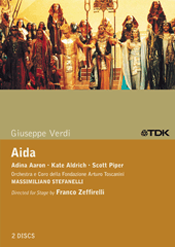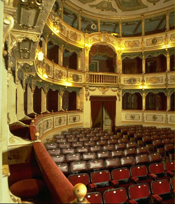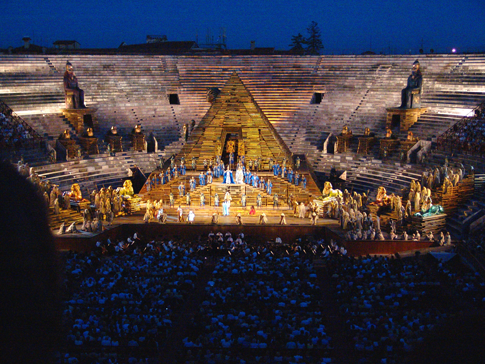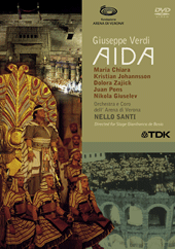
06 Jul 2008
Two Aida’s from TDK
At one time, Verdi’s Aida figured as the most performed opera.
The Sixteen continues its exploration of Henry Purcell’s Welcome Songs for Charles II. As with Robert King’s pioneering Purcell series begun over thirty years ago for Hyperion, Harry Christophers is recording two Welcome Songs per disc.
In February this year, Albanian soprano Ermonela Jaho made a highly lauded debut recital at Wigmore Hall - a concert which both celebrated Opera Rara’s 50th anniversary and honoured the career of the Italian soprano Rosina Storchio (1872-1945), the star of verismo who created the title roles in Leoncavallo’s La bohème and Zazà, Mascagni’s Lodoletta and Puccini’s Madama Butterfly.
Collapsology. Or, perhaps we should use the French word ‘Collapsologie’ because this is a transdisciplinary idea pretty much advocated by a series of French theorists - and apparently, mostly French theorists. It in essence focuses on the imminent collapse of modern society and all its layers - a series of escalating crises on a global scale: environmental, economic, geopolitical, governmental; the list is extensive.
Amongst an avalanche of new Mahler recordings appearing at the moment (Das Lied von der Erde seems to be the most favoured, with three) this 1991 Mahler Second from the 2nd Kassel MahlerFest is one of the more interesting releases.
If there is one myth, it seems believed by some people today, that probably needs shattering it is that post-war recordings or performances of Wagner operas were always of exceptional quality. This 1949 Hamburg Tristan und Isolde is one of those recordings - though quite who is to blame for its many problems takes quite some unearthing.
The voices of six women composers are celebrated by baritone Jeremy Huw Williams and soprano Yunah Lee on this characteristically ambitious and valuable release by Lontano Records Ltd (Lorelt).
As Paul Spicer, conductor of the Royal Birmingham Conservatoire Chamber Choir, observes, the worship of the Blessed Virgin Mary is as ‘old as Christianity itself’, and programmes devoted to settings of texts which venerate the Virgin Mary are commonplace.
Ethel Smyth’s last large-scale work, written in 1930 by the then 72-year-old composer who was increasingly afflicted and depressed by her worsening deafness, was The Prison – a ‘symphony’ for soprano and bass-baritone soloists, chorus and orchestra.
‘Hamilton Harty is Irish to the core, but he is not a musical nationalist.’
‘After silence, that which comes closest to expressing the inexpressible is music.’ Aldous Huxley’s words have inspired VOCES8’s new disc, After Silence, a ‘double album in four chapters’ which marks the ensemble’s 15th anniversary.
A song-cycle is a narrative, a journey, not necessarily literal or linear, but one which carries performer and listener through time and across an emotional terrain. Through complement and contrast, poetry and music crystallise diverse sentiments and somehow cohere variability into an aesthetic unity.
One of the nicest things about being lucky enough to enjoy opera, music and theatre, week in week out, in London’s fringe theatres, music conservatoires, and international concert halls and opera houses, is the opportunity to encounter striking performances by young talented musicians and then watch with pleasure as they fulfil those sparks of promise.
“It’s forbidden, and where’s the art in that?”
Dublin-born John F. Larchet (1884-1967) might well be described as the father of post-Independence Irish music, given the immense influenced that he had upon Irish musical life during the first half of the 20th century - as a composer, musician, administrator and teacher.
The English Civil War is raging. The daughter of a Puritan aristocrat has fallen in love with the son of a Royalist supporter of the House of Stuart. Will love triumph over political expediency and religious dogma?
Beethoven Symphony no 9 (the Choral Symphony) in D minor, Op. 125, and the Choral Fantasy in C minor, Op. 80 with soloist Kristian Bezuidenhout, Pablo Heras-Casado conducting the Freiburger Barockorchester, new from Harmonia Mundi.
A Louise Brooks look-a-like, in bobbed black wig and floor-sweeping leather trench-coat, cheeks purple-rouged and eyes shadowed in black, Barbara Hannigan issues taut gestures which elicit fire-cracker punch from the Mahler Chamber Orchestra.
‘Signor Piatti in a fantasia on themes from Beatrice di Tenda had also his triumph. Difficulties, declared to be insuperable, were vanquished by him with consummate skill and precision. He certainly is amazing, his tone magnificent, and his style excellent. His resources appear to be inexhaustible; and altogether for variety, it is the greatest specimen of violoncello playing that has been heard in this country.’
Baritone Roderick Williams seems to have been a pretty constant ‘companion’, on my laptop screen and through my stereo speakers, during the past few ‘lock-down’ months.
Melodramas can be a difficult genre for composers. Before Richard Strauss’s Enoch Arden the concept of the melodrama was its compact size – Weber’s Wolf’s Glen scene in Der Freischütz, Georg Benda’s Ariadne auf Naxos and Medea or even Leonore’s grave scene in Beethoven’s Fidelio.

At one time, Verdi’s Aida figured as the most performed opera.
The Metropolitan Opera’s database, for example, shows that it has been performed there more than 1,000 times since November 1886. The number of performances has declined in recent years, largely because of the work’s cost of production, the work’s vocal demands and the work’s relative conservatism. Nonetheless, Aida holds an important place in Verdi’s oeuvre and today’s repertoire. As Roger Parker has noted:
Aida remains the most radical and ‘modern’ of Verdi’s scores: its use of local colour. Aida, constantly alluding to its ambience in harmony and instrumentation, is the one Verdi opera that could not conceivably be transported to another geographical location. In this respect it was an important indication of the influence local colour would come to have over fin-de-siècle opera, and an object lesson on the delicacy and control with which this colour could be applied to the standard forms and expressive conventions of Italian opera.
Roger Parker: ‘Aida’, Grove Music Online (Accessed 25 June 2008).
Before me are DVDs of two highly disparate productions of Aida. One is a production presented at the Arena di Verona. Built in 30 C.E., the Arena is a huge open-air structure that seats 15,000.
The other production by the master of extravaganza, Franco Zeffirelli, comes from Teatro Giuseppe Verdi in Busseto, Verdi’s birthplace. Teatro Giuseppe Verdi barely seats 350; but this lovely theater is truly a small jewel.
Aida is a colossal work that brings out massive ideas in stage design. These two productions live up to that concept perfectly. So I will review these DVDs separately. But I invite the reader to keep in mind the contrasts between these productions as well as their similarities. Those very things are a tribute to the mastery of Verdi.
 Teatro Giuseppe Verdi
Teatro Giuseppe Verdi
| Aida | |
| Teatro Giuseppe Verdi, Busseto Italy | |
| Performance: January 27, 2001 (the 100th anniversary of Verdi’s death) | |
| Production designed by Franco Zeffirelli | |
| Conductor: Massimilano Steffanelli | |
| The King of Egypt | Paolo Pecchioli |
| Amneris | Kate Aldrich |
| Aida | Adina Aaron |
| Radames | Scott Piper |
| Ramfis | Enrico Giuseppe Iori |
| Amonastro | Giuseppe Garra |
Coached by Carol Bergonzi and directed by Franco Zeffirelli , this production cast young performers to celebrate the 100th anniversary of Verdi’s death. The size of the theater did not stop Zeffirelli from doing what he does best-spectacle. What actual sets there are look massive and fit the aura of what Aida is supposed to look like. Other dramatic views are achieved through the skillful use of painted or projected back drops. Albeit small, the orchestra was up to the task in the theater’s tiny pit. The flute solo was particularly notable.
The singers, who were then hardly in their 20's, are not well-known. Some may recognize a few of the names, such as Kate Aldrich and Scott Piper.
Piper possesses a nice tenor voice. As Radames, he tentatively tackles “Celeste Aida,” delivering a credible rendition of that monster. He can sing loud and with a robust sound, be it in victory or rejoicing, yet sings tenderly and softly in the last duet.
Kate Aldrich performs Amneris. One does not think of a mezzo tackling this role early in a singer’s career, but Aldrich makes Amneris believable. Although she does not bring the subtlety to it that a Zajick does, that is a learned attribute. Aldrich is sensitive, cunning yet able to demonstrate the insecurity of thinking her chosen man has given his heart to another. When she knows at the end of Act IV that she has lost Radames, her remorse is clearly felt.
It is a bit disconcerting to see the High Priest, the King, and Amanastro so youthful looking and sounding. They are nevertheless believable and refreshing.
Zeffirelli skillfully handles the “big scenes” on the tiny stage. He does not include the ballet for the most part. And the grand triumphal march is presented as a parade that the waving extras look on. We see their backs as they jockey for position to see the spectacle. The music is well played so we do not miss that triumphant moment. As the parade ends, Radames appears in the Temple where the victory ceremony is performed.
There are other nice touches. In Act III Aida sings of her country (“O Patria mia”) as she sits at the banks of the river and reaches into the water to touch it and bring her wet fingers to her face…….almost as holy water. Aaron sings this great aria convincingly.
My favorite portion of Aida is the ending duet. I want it to be tender and loving. These two young singers do it with aplomb.
The costumes are lush and lavish. Soft pastels and vivid reds are well presented. The colors darken as the tragic ending of the opera approaches.
I found this little production refreshing. I appreciated what it must mean to these young singers to work with the masters like Bergonzi and Zeffirelli and to be in a DVD that is in world wide distribution.
 Aida at Arena di Verona
Aida at Arena di Verona
| Aida | |
| Arena di Verona | |
| Performance: August 1992 | |
| Production directed by Gianfranco De Bosio | |
| Conductor: Nello Santi | |
| Aida | Maria Chiara |
| Il Re | Carlo Striuli |
| Amneris | Dolora Zajick |
| Radames | Kristjan Johannsson |
| Amonastro | Juan Pons |
| Ramfis | Nicola Ghiuselev |
 This massive production befits the location. Opera has been presented in
the Arena di Verona since 1913. Production designers have been tempted by the
vastness of the space available to them, and have often used live animals and
enormous sets.
This massive production befits the location. Opera has been presented in
the Arena di Verona since 1913. Production designers have been tempted by the
vastness of the space available to them, and have often used live animals and
enormous sets.
This production follows the traditions of this ancient arena. Huge sets depicting the temple, trumpeters high above the top of the sets and a cast of what seemed like thousands (but probably not quite that many!). There are live horses in the triumphal scene, but no elephants!!
All of the ballet music is there along with the dancers. Nothing is missing in this extravaganza.
Maria Chiara was arguably one of the great Aida’s of her time. She was the partner of many a great Radames, including Luciano Pavarotti. This time frame is late in her career but she still can carry off the role. There are a few rough patches at the top of her voice but not enough to really complain about. Her “O Patria Mia” is lovely and heart wrenching.
When this video was made, Kristjan Johannsson was just beginning his career, which led him to the Met as well as most of the opera houses in Europe. His style is rough and direct. His only voice level is loud. I hesitate to be overly critical in that the location could well be overwhelming and the tenor may have tried to over compensate for that. When a bit of a tender sound is called for, as in the final duet, Johannsson is just not able to produce it. His robust moments, however, are more appropriate.
Juan Pons as Amonastro is worth watching and hearing. He brings to the role the tenderness of a father and the regalness of a King.
Dolora Zajick is a force to be reckoned with. This voice is truly amazing. Her acting ability is everything one would want from this Amneris. She easily makes us hate her, empathize with her and in the end mourn with her. She is one of the great Amneris’ of our time.
Nello Santi is an old pro and the orchestra gets to show off all its skills as it traverses Verdi’s score. We all wait for the trumpets and brass in this opera; but there are some wonderful flute solos, as well.
This video is well worth the time to watch Aida as a huge spectacle and to hear some amazing singing by the women in the cast. With the exception of Pons, one must bear the male performers to enjoy this production.
Cheryl Dowden